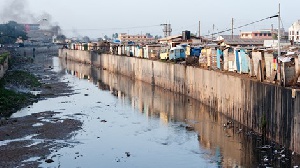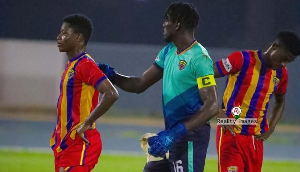The biggest drain in Accra – the Odaw gutter, which is supposed to carry all flood waters within Accra into the Atlantic Ocean, is in a terrible state, choked from extreme human activity.
With more rains predicted, heavy flooding is expected in most parts of Accra since the Odaw gutter can barely carry any water that runs through it as a result of extensive pollution.
Construction work began on the Odaw drain in 1999 in a project funded by the World Bank through its International Development Assistance and the Agence France de Development. It was aimed at ending the perennial flooding in the metropolis but this vision seems to have failed.
The river flows from Abokobi and Adjankote Hills through Ashongman, Atomic Energy Area, West Legon, Achimota, Alajo, Avenor, Agbogbloshie and into the Atlantic Ocean through the Korle Lagoon. But a recent visit by the Weekend Globe showed the river had become a dumping site for solid waste. Tonnes of plastic waste have been deposited in the once fresh river.
More and more people continue to settle along the banks of the river, notably, squatters at the slum Sodom and Gomorrah. The squatters use sawdust to stabilize the banks of the drain to enable them construct their wooden structures. The river has also become a place of convenience for these residents. People can be seen squatting along the banks to attend to nature’s call. The practice is carried out even in broad daylight.
Some of the residents who live around the area spoke to The Weekend Globe expressing their frustration that their current state of care. One resident, Musa said “The garbage here has made this place look nasty and the stench is unbearable. The situation is very serious, if there is a heavy downpour the river will overflow. Government must come and help us. I know they started an exercise to dredge the river but the exercise has been stopped for some time now…”
The stench that emanates from the river is unbearable and compounding the problem is the presence of scrap dealers and mechanics from Caprice, through to the Neoplan Station and to the Korle Lagoon, who have turned the banks of the river into a hub of metal scrap activities. Broken down television sets, radio sets, computers, fridges and other electronic gadgets are heaped on the banks of the river on a daily basis. The metal scraps are dismantled by the mechanics and the obsolete gadgets dumped into the river. This exposes the river to toxic waste- for instance mercury which has left the river dead. There is no sign of aquatic life as extensive pollution has killed the fishes.
There have been attempts in the past to dredge the river but that has failed over the years because garbage is continually discarded into it. Major dredging works undertaken between 2002 and 2004 have been undermined following increasing population and socio – economic activities and the erection of illegal structures along the banks.
In 2012, the Accra Metropolitan Assembly awarded a sectional dredging of the Odaw River to Zoomlion Ghana Limited. The contract was awarded at the cost of 2 million Ghana cedis and the company was expected to dredge from Caprice to the Graphic Road. But work stalled because Zoomlion did not have the requisite equipment to carry out the job.
Accra has had to pay dearly in times past for this. On July 4, 1995, the Daily Graphic newspaper reported the death of over 17 people as a result of flooding. Over 1000 families were reportedly displaced in the process. Properties and infrastructures worth thousands of Ghana cedis were also reportedly destroyed, and economic activities disrupted. Another report on June 28, 2001 said floods had resulted in the death of twenty people, displaced thousands of households, and destroyed millions of cedis worth of property.
Between 1995 and 2007, more than ten incidents of flooding were recorded in Accra and it all resulted in human casualty, displacement of households, infrastructure damage, and disruption of economic activities. In November 2011, the Daily Graphic reported 14 deaths following floods in the metropolis and 43,000 were displaced. The situation is set to become worse if nothing is done about the Odaw drain.
A food vendor at the bank of the river told the paper, “I sell food here and if the river should overflow its banks, it will affect me. We are pleading with government to come to our aid. This is what I do for a living and sometimes people do not patronize my food because of the nature of the river…as you can see, the mechanics are always burning tyres and we have to inhale all the smoke. So we are facing a big problem here.”
It is not only this trader whose business will be affected in the case of the worst. There are several business owners who have expressed concern about the choked river, especially businesses in the industrial area, Graphic Communications area towards the Agbogbloshie Market.
The Weekend Globe contacted the Accra Metropolitan Assembly (AMA) to find out what the assembly was doing about the situation. Public Relations Officer, Numo Blafo said the Assembly was unable to stop people from dumping rubbish into the river.
He said, “those who dump refuse into the river do it within certain communities and if nobody in the community talks about it, nobody even alerts authorities about it, why should the AMA be blamed for the problem?”
According to him, efforts to dredge the Odaw River are being hampered by the continuous dumping of garbage.
“While we are spending so much to clean the place, people are also doing all they can to ensure that the place is not clean. We therefore have a problem. The AMA is taking steps to clean the place up. At least we are doing something to make sure that the problem is addressed.” He said.
No doubt Accra is headed for a major disaster if urgent steps are not taken to deal with the threat posed by the present condition of the Odaw River. While it is important for the drain to be dredged, the situation also calls for attitudinal change to salvage what was once a beautiful landscape.
General News of Monday, 23 September 2013
Source: The Weekend Globe

















